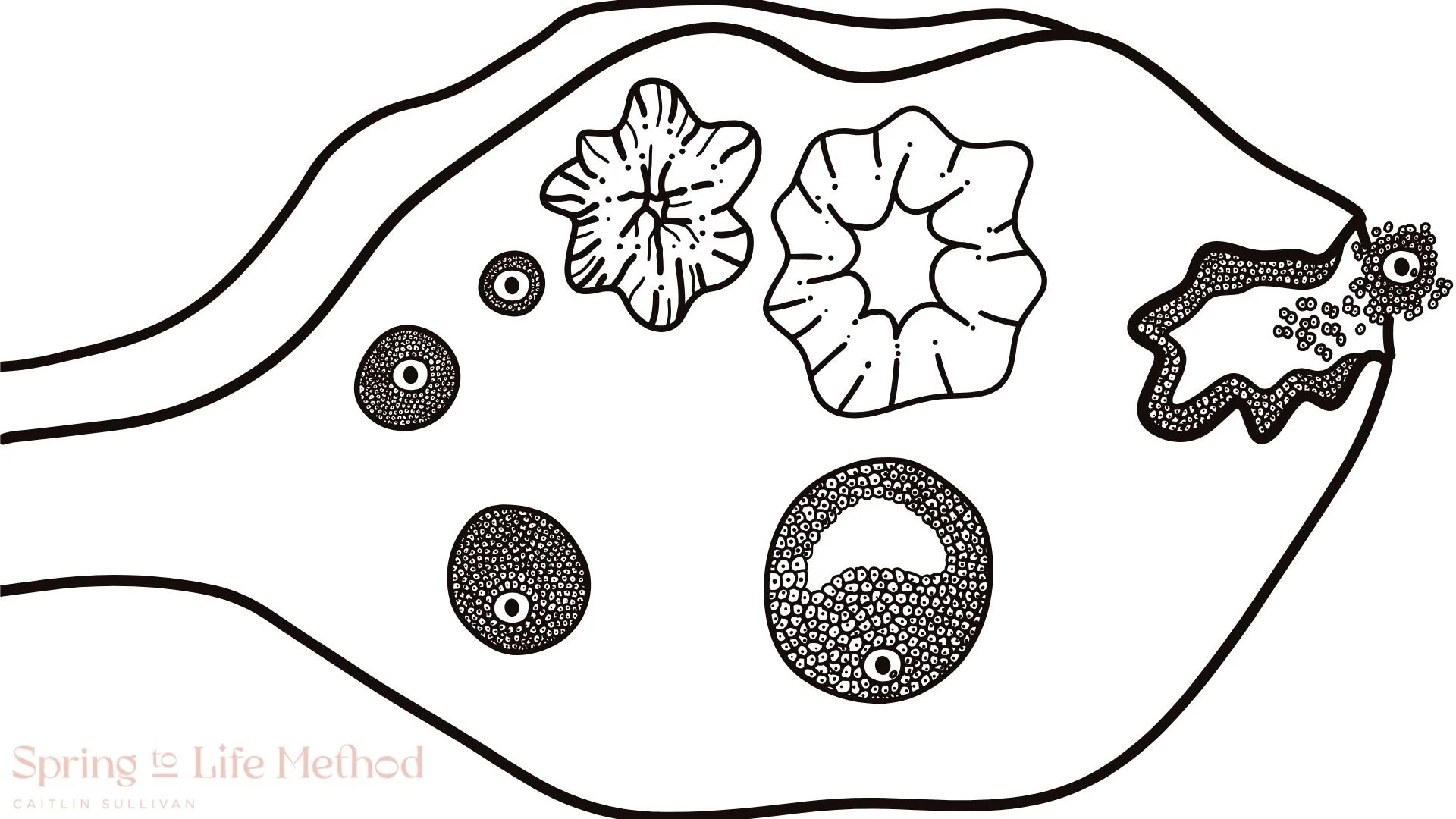Progesterone: The Hormone That Can Save Your Cycle
When we talk about hormones, estrogen usually gets all the attention. But if estrogen is the bright, fiery yang, then progesterone is the calming yin—and when it’s missing, everything in your cycle feels off.
From painful PMS to heavy bleeding, anxiety, or restless nights, low progesterone is often at the root of many symptoms women think are “just normal.” The truth? They’re not inevitable—and restoring healthy progesterone levels can transform your cycle.
Let’s dive into why progesterone is so important, the signs you might be low, and how food, lifestyle, and smart supplements can help your body produce more of this balancing, soothing hormone.
Progesterone provides the yin to estrogen’s yang
Why Progesterone Matters
Progesterone’s main biological job is to support pregnancy (pro-gestation… progesterone). But whether or not you want children, it plays an essential role in overall health and well-being.
Here are some of progesterone’s powerful benefits:
Thins the uterine lining, preventing heavy bleeding
Reduces risk of breast cancer
Boosts thyroid hormone function
Calms inflammation in the body
Promotes muscle building and recovery
Supports deep, restorative sleep
Calms the nervous system, reducing anxiety
Prevents PMS
Pretty incredible, right? Progesterone is one of your body’s natural protectors.
The Catch: How Progesterone Is Made
Here’s the tricky part: your body can only make progesterone after ovulation.
When your ovary releases an egg, the empty follicle left behind transforms into a temporary gland called the corpus luteum. This little gland is what produces progesterone during the second half of your cycle.
That means if you’re not ovulating regularly—or if you’re taking hormonal birth control (which suppresses ovulation)—your body isn’t making progesterone.
Ovulation MUST occur in order for progesterone to be produced
Stress and Progesterone: A Delicate Balance
Even if you’re ovulating, progesterone is highly sensitive to stress.
Your adrenal glands make both cortisol (your stress hormone) and progesterone from the same precursor hormone. When your body thinks it’s in survival mode—due to chronic stress, irregular eating, illness, or lack of sleep—it prioritizes cortisol over progesterone.
In other words, stress steals progesterone.
Signs You Might Be Low in Progesterone
How do you know if progesterone is running low? Look for these telltale symptoms:
Heavy or painful periods
PMS (acne, cramps, breast tenderness, mood swings)
Anxiety or depression
Fatigue
Trouble sleeping
Anovulatory cycles (periods without ovulation)
If these sound familiar, you’re not alone—and the good news is, you can support progesterone naturally.
PMS symptoms should not be ruling your life or taking you out every month
How to Support Progesterone With Food
Food is one of the most powerful tools you have to nourish your hormones. Certain nutrients are especially important for healthy progesterone production:
Calcium – supports ovulation and hormone balance
Magnesium – relaxes the nervous system and improves progesterone response
Omega-3 fatty acids – calm inflammation and stabilize hormones
Vitamin B6 – improves corpus luteum function and progesterone levels
Zinc – essential for ovulation and hormone synthesis
Magnesium-rich foods for progesterone and PMS relief
Progesterone-Supporting Foods
Citrus fruits (Vitamin C for corpus luteum health)
Dark leafy greens (calcium + magnesium)
Pasture-raised poultry and grass-fed beef (B vitamins + zinc)
Wild-caught salmon and shrimp (omega-3s + zinc)
Sesame and sunflower seeds (seed cycling nutrients)
Bell peppers (Vitamin C + antioxidants)
Dark chocolate (magnesium + zinc)
Vitamin C-rich foods to boost progesterone naturally
Recipes to Try
Adding progesterone-friendly foods into your weekly meals doesn’t have to be boring. Try:
Flourless Sweet Potato Brownies – a nutrient-dense treat with antioxidants and magnesium
Beef & Kimchi Bowl – combines zinc, probiotics, and iron
Cabbage & White Bean Soup – mineral-rich and soothing for the gut
Simple swaps and colorful meals add up to meaningful hormone support.
Do You Need Supplements?
Even with the best diet, our modern food supply is not as nutrient-rich as it once was. Soil depletion, processed food, and busy lifestyles mean supplements can be a helpful boost.
Here are my top recommendations for supporting progesterone naturally:
Magnesium – Ned’s Mellö Magnesium contains three bioavailable forms (gluconate, citrate, glycinate) plus l-theanine and GABA for stress support. (Code SPRINGTOLIFE for 15% off single orders, 20% off subscriptions.)
Vitamin B Complex – Marea PMS Elixir provides over 1,400% DV for B6 and 800% DV for B12, plus all the micronutrients needed for PMS-free cycles. (Code SPRINGTOLIFE for 15% off.)
Seed Cycling Packs – A simple way to add hormone-friendly seeds daily. Funkit Wellness makes pre-ground seed blends and cycle bites. (Code SPRINGTOLIFE for 20% off.)
Lifestyle Tips for Healthy Progesterone
Progesterone thrives when you slow down and give your body the space to recover. Here are a few simple lifestyle shifts that make a big difference:
Prioritize rest: Aim for 7–9 hours of quality sleep.
Manage stress: Breath work, meditation, or gentle Pilates can lower cortisol.
Balance blood sugar: Avoid long gaps between meals; pair protein + fiber with carbs.
Support your luteal phase: After ovulation, favor restorative exercise over high-intensity workouts.
Remember: your body only makes progesterone after ovulation. Supporting ovulation through stress management, balanced nutrition, and recovery is key.
Find a stress management technique that works for you like yin yoga or meditation
Bringing It All Together
Progesterone is truly the unsung hero of women’s health. It balances estrogen, supports fertility, reduces inflammation, calms anxiety, and prevents PMS.
But because progesterone is only made after ovulation—and so sensitive to stress—it often runs low in our modern world.
The empowering news? Through nourishing foods, smart supplementation, and stress-reducing lifestyle shifts, you can help your body produce more progesterone naturally.
✨ The result: lighter, easier periods, calmer moods, deeper sleep, and the kind of hormonal balance that makes you feel at home in your own body.







